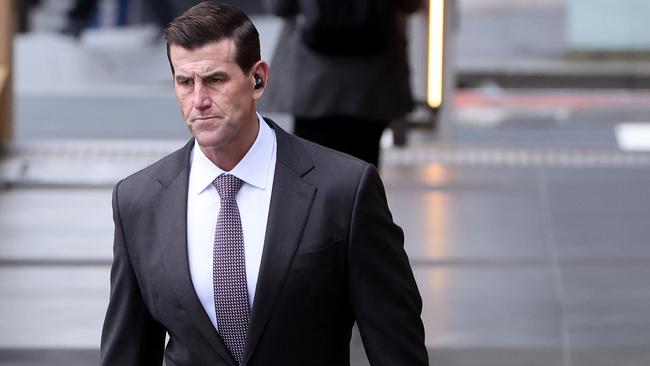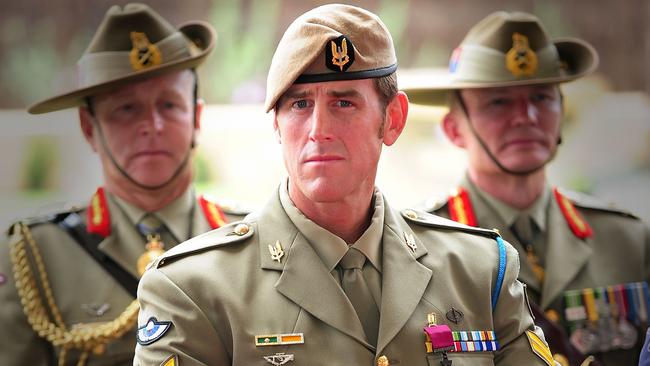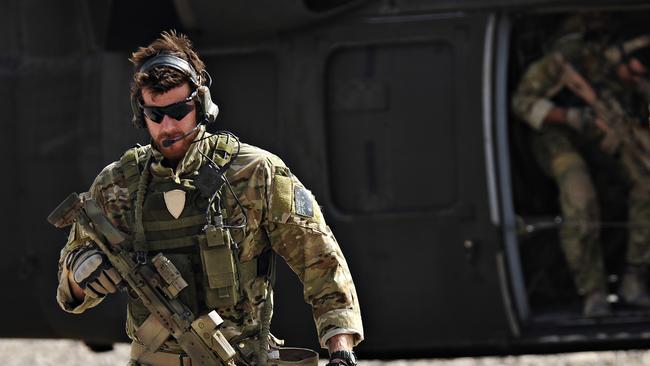‘You know what you’ve done’ threats emerge in Roberts-Smith trial
Chilling threats sent to Ben Roberts-Smith’s enemies have been read in court - but the elite soldier denies he sent them.
Ben Roberts-Smith’s “enemies” in the SAS were told to admit they colluded and lied because it’s “better to take a reprimand than murder charges” in threatening letters the elite soldier denies sending.
Mr Roberts-Smith’s defamation lawsuit against Nine returned to open court on Wednesday afternoon.
Nine’s barrister Nicholas Owens accused the decorated soldier of using his former private investigator, John McLeod, to send threats to another SAS veteran known as Person 18.
“You and others have worked together to spread lies and rumours to the media and (Inspector General of the Australian Defence Force) inquiry,” the June 2018 letter reads.
Mr Roberts-Smith believed that, when the letters were sent, that soldier had been talking with Person 6, his “enemy” in the SAS community, and the media.
The IGADF, at that time, was hearing evidence from the SAS veterans about war crime allegations in Afghanistan - including Mr Roberts-Smith, his friends and those he disliked.
“You have one chance to save yourself,” the letters said.
“You must approach the inquiry and admit that you have colluded with others to spread lies.”
The letter warned that the people being lied about would shift their focus to Person 18 if he did not retract his statements to the investigators.

The letters warned Person 18 would be exposed and accused of murdering two prisoners, known in the military as Persons Under Confinement, if he kept up his evidence.
“We are very aware of your murderous actions over many tours of Afghanistan … You know what you have done and so do we.”
The letter said the execution of the PUCs happened in the battle of Tizak, which is where Mr Roberts-Smith was awarded the Victoria Cross for storming machine gun nests.
“Don’t forget this, it won’t go away,” the letter continues, “you will go down, better to take a reprimand than murder charges”.
Mr Roberts-Smith denied he sent those letters or had Mr McLeod send them on his behalf.
He also denied a heated conversation with his former wife about his fingerprints on the letters and denied burning the envelopes at his home.
Mr Roberts-Smith said he had clashed for years with Person 6 and believed Person 6 was driving the “whispering campaign” with journalists.
Witness lists reveal Nine will call Person 6 to give evidence against Mr Roberts-Smith while the decorated veteran will call his own SAS allies including people who spoke to the IGADF.
Mr Owens took Mr Roberts-Smith through a letter he’d written to his lawyers and Mr McLeod that detailed allegations Person 6 had smuggled guns into Afghanistan.

Mr Roberts-Smith’s letter was sent to Senator Nick Xenophon and Australian Federal Police Commissioner Andrew Colvin - but the soldier said that was decided and carried out by Mr McLeod.
“You made anonymous complaints to police about Person 6 so he’d become the subject of a police investigation?” Mr Owens said.
“No,” Mr Roberts-Smith said.
“And it would intimidate him to not say adverse things about you in the media?”
“No, that’s not true,” Mr Roberts-Smith insisted.
Mr Roberts-Smith said he’d “exposed” Person 6’s character because the SAS high command had done nothing to investigate the source of leaks to the media.
“I didn't have a grudge, I wanted to make it clear this individual was not to be trusted,” he said.
Person 6’s home was ultimately raided by WA Police who found no evidence of illegal firearms and laid no charges, the court heard.
The letter also ended up in the hands of a journalist at The Australian who said it had been penned by an “SAS whistleblower” and Person 6 was known for making a complaint against Mr Roberts-Smith.
The court heard former AFP Commissioner Mick Keelty contacted and met with Mr Roberts-Smith as the allegations swirled.

Nine’s barrister said Mr Keelty divulged to Mr Roberts-Smith that there was an open investigation into him and ran him through the internal machinations of the AFP including “difficulties” in mounting prosecutions for crimes committed overseas.
Mr Roberts-Smith denied he knew about any investigation at that time and Mr Keelty only told him about “referrals”, which he could not speak about because to do so would be “improper”.
Mr Roberts-Smith also told the court he used prepaid phones, purchased by his former wife’s friend, to avoid detection.
He rejected Nine’s claims he was worried about the IGADF or AFP - insisting he was only worried about the media intercepting his communications.
The veteran agreed he had destroyed a laptop hard drive by pouring petrol all over it and setting it alight.
He told the court that was his regular practice to ensure data was destroyed and had done it for years before any of the war crime allegations emerged.


